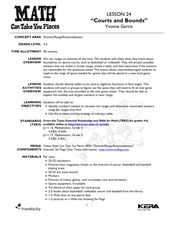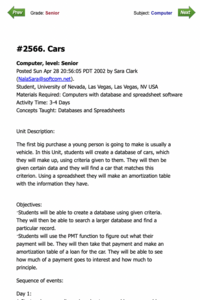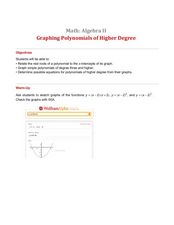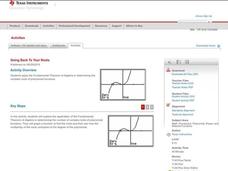Curated OER
Courts and Bounds
Students relate what they know about boundaries on sports courts to explore range of space. In this domain and range lesson, students identify numbers needed to calculate ranges and use the problem solving strategy of making a table.
Curated OER
Cars: Math, Research, Economics, Loans
Students investigate what the purchasing of a car entails. They explore car criteria and financing options.
Curated OER
Exponential Decay
Students study exponential decay and its application to radiocarbon dating. In this exponential decay lesson, students use candy to model the time it takes for something to decay. Students also graph the data they collect and...
Curated OER
Animal Skin
Students investigate the skin surface to body area ratios for different animals. In this seventh/eighth grade mathematics/science activity, students explore heat transfer between an animal’s body and the environment. Using...
Curated OER
Going Back to Your Roots
Investigate the Fundamental Theorem of Algebra and explore polynomial equations to determine the number of factors, the number of roots, and investigate multiplicity of roots.
Curated OER
Graphing Polynomials of Higher Degree
Using Wolframalpha graphing capabilites, algebra learners graph polynomials with degrees of three and larger. They identify the roots and graph each polynomial, predict zeros and shapes of graphs, and validate their understanding through...
Curated OER
Going Back to Your Roots
Who doesn't need to know the Fundamental Theorem of Algebra? Use the theorem to find the roots of a polynomial on a TI calculator. The class explores polynomials with one solution, no real solutions, and two solutions. This less lesson...
Curated OER
The Intermediate Value Theorem
You and your calculus learners will appreciate this description, discussion, and examples of the Intermediate Value Theorem. Applications of the theorem are also discussed.
Curated OER
Vernier - A Speedy Slide with EasyData™ App and CBR 2™
Mathematicians use a CBR 2™ motion detector to determine their speed or velocity going down a playground slide. They also experiment with different ways to increase their speed going down the slide. Finally, students complete the Student...
Curated OER
Super Ticket Sales
Use this graphing data using box and whisker plots lesson to have learners make box and whisker plots about ticket sales of popular movies. They find the mean, median, and mode of the data. Pupils compare ticket sales of the opening...
Curated OER
NUMB3RS Activity: Coded Messages
Using matrix multiplication and inverse matrices, learners are trying to uncode a coded message. Students encrypt simple messages using 2 x 2 matrices.
Texas Instruments
Factoring and Solving Quadratic Binomials
Here is a TI-Navigator™ activity that allows students to review the concept of factoring and solving quadratic binomials, including a connection to graphical solutions. They enter a number such as -2 using the minus key and not the...
Curated OER
Powers and Roots of Complex Numbers
Explore a few powers of complex numbers numerically and decide if there is a pattern and use parametric equations to represent a complex number graphically. Use De Moivre's theorem to represent the roots of the complex number...
Curated OER
Geometry and Measurement
Young geometers explore relationships between units of measure and objects. Three activities provide varied opportunities to practice. Learners calculate the volume of two cylinders made by rolling a piece of paper vertically and...
Texas Instruments
Exploring Basic Equations
Learners explore equations with constants, variables and with exponents. They identify and define variables, constants, exponents, expressions, and equations, as well as give an example of each. Your class will also draw their...
Curated OER
Linear or Exponential?
Your learners analyze various real-life contexts to decide if each is a linear or exponential model. This could be used as an assessment of learners' skills of discerning between a linear and an exponential model.
Curated OER
Using Matrices to Enter Data and Perform Operations
Here's a TI step by step guided lesson on matrices. The class enters data into the TI calculator about movie ticket sales and uses matrices as a problem solving tool. They add and multiply matrices to determine profit.
Curated OER
NUMB3RS - Season 2 - "Convergence" - Air Hockey
Learn how to use a matrix to organize data to solve a problem. This activity uses wins and losses to rank players for an air hockey tournament they wish to have. After practicing some basic matrix operations the class could do the...
Curated OER
Dilations with Matrices
Examine dilation with matrices with your class. Learners write a conjecture for how the scale factor determines the size of an image. They then use their conjecture to write a matrix multiplication problem for the illustrated...
Curated OER
Exponent Rules
Pupils use calculators to work independently to discover the rules for working with exponents. The lesson requires the use of a TI-nspire handheld and software.
Curated OER
Operating on Matrices
Learners investigate matrices by exploring addition, subtraction and multiplication of matrices. Students find the determinant and inverse of a matrix. The lesson includes a set of practice problems
Curated OER
Watch Your P's and Q's
Using your graphing calculator, find all the rational zeroes of a polynomials by using the Rational Zero Theorem. Divide polynomials using the Remainder Theorem and the Factor Theorem and then graph it to find the number of real roots.
Curated OER
Complex Numbers
The class practices, on paper and/or on a TI graphing calculator the concepts of how to add, multiply, divide and subtract complex numbers using the correct property.
Curated OER
Application of Completing the Square
A TI technology activity that helps learners to recognize and use the characteristic of a perfect square quadratic to complete the square. Additionally, they apply their knowledge to solve real-world problems.

























